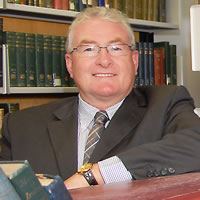Bardic poetry has often been portrayed as a genre that is entirely resistant to change and the bardic poet has even been depicted as a figure whose mindset differed little from that of the pagan priest or druid. It is asserted that this extreme conservatism is manifest in seemingly arcane beliefs such as the notion of the prince being married to his kingdom, the depiction of the poet and his prince as lovers and the entitlement of the poet to share his lord’s bed. This paper will argue that such a characterization ignores the social and political significance of these concepts and overlooks the prevalence of corresponding ideas in late medieval and early modern Europe. Particular attention will be paid to a bardic poem that throws much light on the poet-patron relationship, offers insights into the notion of bardic courtship and presents a novel view of how bardic poetry itself is conceived and created. The contention is that poems such as this must be read within their contemporary cultural and intellectual milieu rather than being seen as shadows of a dim pre-Christian past.

Born in Belfast and educated at St. Malachy’s College and Queen’s University Belfast, Ailbhe is Emeritus Professor of Irish at Ulster University and formerly Director of the Irish and Celtic Studies Research Institute, Derry. He lectured previously in Celtic Languages and Literature at the University of Uppsala, Sweden (1980–87 and 1989–94) and in Celtic Languages at the University of Bonn, Germany (1987–89). He was made a Docent of the University of Uppsala in 1992, designated a Senior Distinguished Researcher at Ulster in 2009 and acted as Visiting Professor in Uppsala from 2008 to 2012. He has published on many aspects of Irish language and literature, in particular in the areas of syntax, semantics and Classical Irish poetry. His Marstrander Lecture on Giolla Brighde Ó hEódhasa (Oslo 2012) led to the publication of The Pearl of the Kingdom: A Study of A fhir léghtha an leabhráin bhig by Giolla Brighde Ó hEódhasa (2013) and this was followed by two other monographs on the same poet, The Light of the Universe: Poems of Friendship and Consolation (2014) and The Dark Cave and the Divine Light: Verses on the Human Condition (2016). Seminal articles on language and linguistics include ‘On the Syntax and Semantics of Expressions of Being in Early Irish’ (1997); ‘Spatial Perception and the Development of Grammatical Categories in Irish’ (1997); Aspects of Voice in the Grammatical Structure of Irish (2001); ‘On the Evolution of Verbal Aspect in Insular Celtic’ (2013) and ‘Rudimenta Grammaticae Hibernicae’ (2017). He is editor-in-chief of Studia Celtica Upsaliensia, Vice-President of Societas Celtologica Nordica and a former president of the European Society for Irish Studies. He currently sits on the Management Board of the Royal Irish Academy’s Historical Dictionary of the Irish Language and on the RIA’s Coiste Léann na Gaeilge, Litríocht na Gaeilge agus na gCultúr Ceilteach. He is Chairman of éigse Cholm Cille and formerly sat on the Management Board of the School of Celtic Studies, Dublin Institute for Advanced Studies.